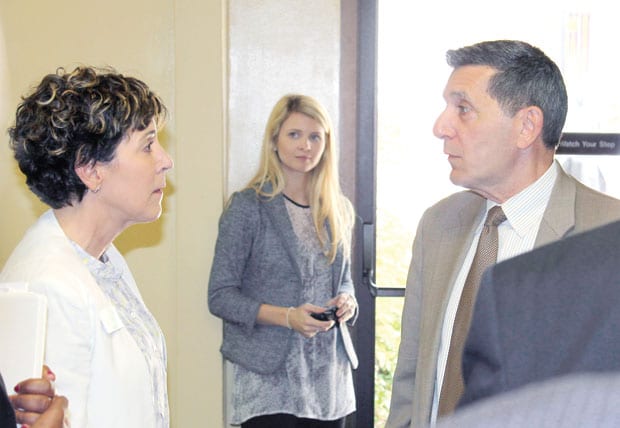Director of National Drug Policy Botticelli visits SMU counseling program at Resource Center

TAKING A TOUR | Resource Center Chief Operating Officer Marisa Elliott, left, takes White House Director of National Drug Policy Michael Botticelli on a tour of the facility before he spoke to counseling students and professionals during his trip to Dallas this week. (David Taffet/Dallas Voice)
Resource Center got a high-profile visitor this week when the White House’s Director of National Drug Policy Michael Botticelli dropped in for a tour of the facilities. Botticelli, who is gay and in addiction recovery, visited the center after contacting Southern Methodist University officials about the school’s partnership with the Resource Center in offering what he called a unique a counseling program for LGBT people.
Botticelli visited Resource Center on June 23 and, later in the afternoon, spoke to students in SMU’s counseling program. After touring Resource Center, he said the work with SMU was a “nice partnership” and something he has rarely seen around the country.
Botticelli said his interest is related to the process of moving the Obama White House’s drug policy from a punitive criminal justice solution to putting people in treatment. Since addiction rates in the LGBT community are higher than the population in general, he said he likes SMU’s focus on delivering culturally competent therapy.
Botticelli said he is impressed by the LGBT track taught at SMU complimenting the addiction and recovery counseling offered in the program. Sabine Rakos directs the partnership program that places SMU counseling students as interns at Resource Center.
Rakos said most schools offer therapists a course in multi-cultural counseling. That might include one chapter and a single lecture on counseling LGBT clients. She said that leaves most students confused about the difference between gender identity and sexual orientation.
At SMU, students in the LGBT track take three courses: affirmative therapy with lesbian, gay and bisexual clients, affirmative therapy with transgender clients and affirmative therapy with LGBT families and couples.
Rakos said the courses address specific problems facing the LGBT community, including substance abuse, major depression and anxiety disorders. Her program helps counselors understand what they’re seeing in the field, she said.
“Someone going through a coming out crisis is often diagnosed bipolar” and, inappropriately, prescribed drugs, she said. In another example, she said, counselors untrained in LGBT issues often determine that if the client were to be less feminine, he wouldn’t be bullied.
Rakos said her program breaks down hetero-normative stereotypes of what a family should look like and teaches a range of what healthy relationships may look like.
Over the past five years, good research has been done in the LGBT community to create culturally responsive strategies for treating people. Rakos said just being gay-friendly isn’t enough: a counselor working in the LGBT community needs to be LGBT-informed. She said she heard recently that a counselor who billed herself as “LGBT-friendly” asked a client if he was the man or the woman in the relationship.
Students take the LGBT track for a wide variety of reasons, Rakos said. About a quarter of the students currently in the program are LGBT.
Others have a gay sibling. So for many of the students, the issue is personal.
“We’re living in a more open society, and they see the struggle of their friends,” Rakos said.
Others are specializing in substance abuse. The incidence of substance abuse in the community is high so, during their fieldwork, those students have found they will be dealing with people who are LGBT.
Virginia Laney is finishing her masters in counseling at SMU and co-facilitates a support group for people with HIV at Resource Center as part of her internship. She said her interest began with LGBT friends of hers.
“Coming here has taught me about the diversity within the gay community,” she said, speaking between appointments with clients at Resource Center. She added that she’s learned to push past her own biases.
“Each person is unique, with their own story,” she said. “Who you are should be celebrated.”
In the HIV support group, interns have come and gone since the group began several years ago, Laney said. What she loves about the group is they get to help train the therapist.
Laney said she enjoys the interaction as people in the group help each other with resources and talk about what works for them. She’s learned what works and what doesn’t work in HIV treatment, especially for those who may be marginalized. But she said she loves that members of the group taught her to be a better therapist as they’ve opened themselves up to her.
SMU’s partnership with Resource Center is about five years old and began with a friendship between the center’s CEO, Cece Cox, and SMU Dean David Chard. Counseling interns already serve about 300 clients a year, and the program is expanding to work with Youth First. Rakos said that presents a variety of new issues in dealing with LGBT youth who are coming out younger than ever.
To contact SMU’s program at Resource Center, call 214-393-3680.
This article appeared in the Dallas Voice print edition June 27, 2014.

